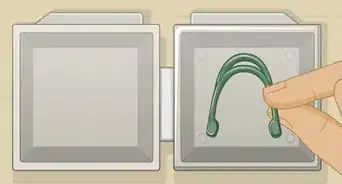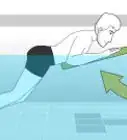This article was co-authored by Brad Hurvitz. Brad Hurvitz is a Certified Swimming Instructor for My Baby Swims, an adolescent swimming school based in La Jolla, California. Brad is trained as an Infant Swimming Resource (ISR) instructor with ISR's Self-Rescue® program. He specializes in training children aged six months to six years of age survival skills like floating on their back to breathe and swimming back to the wall, while also educating parents on how to better keep their kids safe. He has a Master of Business Administration from Oregon State University.
There are 10 references cited in this article, which can be found at the bottom of the page.
This article has been viewed 148,712 times.
Goggles can be uncomfortable or have imperfect seals that render them useless to the average swimmer. Keeping your eyes open underwater can cause irritation of your mucous membranes (eyes, nose).[1] However, it is necessary in many cases. Adjusting to an underwater environment and its visual distortions is key to spending any amount of time underwater, and opening your eyes underwater is the first step. [2]
Steps
Practicing at Home
-
1Go to your bathroom and fill your sink with water. You will want to ease in and start with tap water as opposed to pool water or open freshwater and saltwater. The sink should be full enough that you can submerge your face at least halfway. Avoid temperatures that shock or scald the skin with cold or hot to make the process easier.
-
2Put your face in with eyes closed. Let your face adjust to the temperature and make sure you feel comfortable and calm when you are submerged underwater. If your nose is irritated at this stage, you should stop, as your eyes are likely to become more irritated by chlorine or cleaning byproducts from halogen-based cleaners. [3]Advertisement
-
3Submerge yourself in a bathtub. Practice keeping your eyes open underwater as long as you can hold your breath. The temperature of the water should be moderate to cold, as in pools or the sink earlier. Continue practicing this until you have no trouble and don’t mind the irritation of exposing your eyes to water.
Opening your Eyes While Swimming
-
1Find a minimally treated water source. Practice swimming in a pool that uses non-chlorine based cleaners or fresh water. While chlorine has not been conclusively found to cause eye irritation or corneal damage, it has been found to increase this activity in by-products of pool cleaners. Larger pools should be avoided, as they are most likely to use hypochlorite or elemental chlorine to maintain water quality.
-
2Submerge yourself and open your eyes. If you are in fresh water, you should expect a minimum of irritation, but treated or saltwater is far more likely to contain irritants. While your eyes might become irritated and your corneas irritated, loss of visual acuity is unlikely without excessive time spent practicing. [4]
-
3Practice adding time with your eyes open. Work at this, minding irritation to your eyes or exhaustion swimming until you can keep your eyes open underwater as long as you can hold your breath. Focus on increasing the time you keep your eyes open and focused underwater each time. Avoid deep or treacherous areas if you are not already a strong swimmer.[5]
-
4Practice keeping your eyes open and seeing underwater. You will likely want to spread this over several sessions to minimize risk of irritation if you are in a treated pool or saltwater, though it likely should not take too long before you are comfortable. You will want to practice in multiple water sources, which can vary considerably in their visibility and color. Avoid any unsanitary or stagnant water while practicing, as waterborne infections are a risk in small lakes and ponds.[6]
- You will need additional practice to parse visual information underwater accurately. [7] Practice estimating distance with objects that you know are a certain depth or distance from you, and estimate how long it takes you to reach the object to get a sense of your ability to react to these things.
- If you are diving, avoid going too deep in an unpressurized suit. Pressure changes during ascent can easily cause burst capillaries and damage to the ears. Make sure you can easily equalize the pressure when you dive with ease. [8]
Community Q&A
-
QuestionHow can I open my eyes if I'm scared?
 Community AnswerTry wearing goggles and leaving a slight gap in them so water can slowly seep in. This way you get used to your eyes having contact with the water. Take it slow. I did this and I was scared at first, but it worked for me.
Community AnswerTry wearing goggles and leaving a slight gap in them so water can slowly seep in. This way you get used to your eyes having contact with the water. Take it slow. I did this and I was scared at first, but it worked for me. -
QuestionCan people keep their eyes open underwater after some practicing?
 Community AnswerYes. It's just a matter of overcoming whatever fear you have about it.
Community AnswerYes. It's just a matter of overcoming whatever fear you have about it. -
QuestionWhat if you have sensitive eyes? What do you do if all these steps still hurts your eyes?
 Community AnswerDon't do it. Remember, this is only if you feel comfortable with opening your eyes. Just use goggles or a diving mask.
Community AnswerDon't do it. Remember, this is only if you feel comfortable with opening your eyes. Just use goggles or a diving mask.
Warnings
- Avoid swimming or opening your eyes in stagnant or untreated pools. The risk of infection is high when you expose your mucous membranes to untreated water and microbes that live there. [11]⧼thumbs_response⧽
- Avoid chlorinated pools especially if you have respiratory problems, as ambient chlorine gas concentrations have been linked to respiratory problems in swimmers. [12]⧼thumbs_response⧽
References
- ↑ http://europepmc.org/abstract/med/9531722
- ↑ http://dspace.rubicon-foundation.org:8080/xmlui/handle/123456789/8674
- ↑ http://europepmc.org/abstract/med/9531722
- ↑ http://jama.jamanetwork.com/article.aspx?articleid=386706
- ↑ Brad Hurvitz. Certified Swimming Instructor. Expert Interview. 13 February 2020.
- ↑ Brad Hurvitz. Certified Swimming Instructor. Expert Interview. 13 February 2020.
- ↑ http://dspace.rubicon-foundation.org:8080/xmlui/handle/123456789/8674
- ↑ http://www.nejm.org/doi/pdf/10.1056/NEJM199201023260105
- ↑ http://journals.lww.com/corneajrnl/Abstract/2008/01000/Deleterious_Effects_of_Swimming_Pool_Chlorine_on.6.aspx
About This Article
Keeping your eyes open underwater can be a little tricky at first, but with enough practice, you'll get used to the feeling. One way to practice is to fill up your sink with lukewarm tap water and submerge your face in it. Start with your eyes closed, then when you feel comfortable, open your eyes. You can also try this in a bathtub or a pool. Practice opening your eyes for longer amounts of time until you get used to the sensation. Once you're comfortable keeping your eyes open underwater, try swimming around in a pool and looking for objects at the bottom of it to practice even more. To learn how to improve your depth perception underwater, read on!
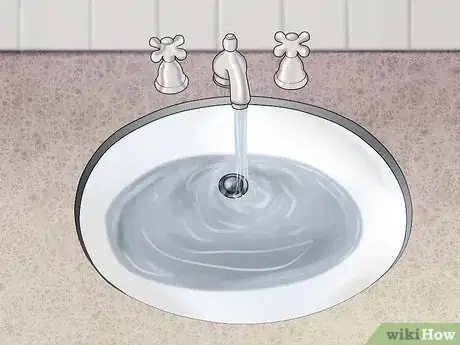







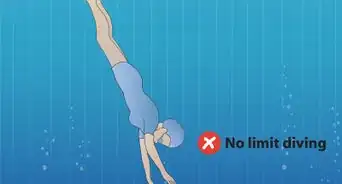
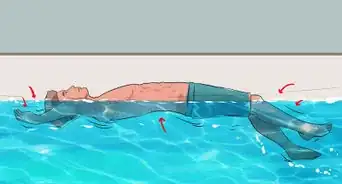



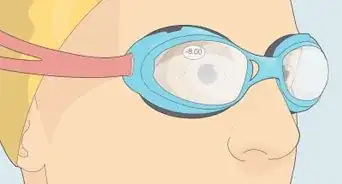

-Step-22.webp)
